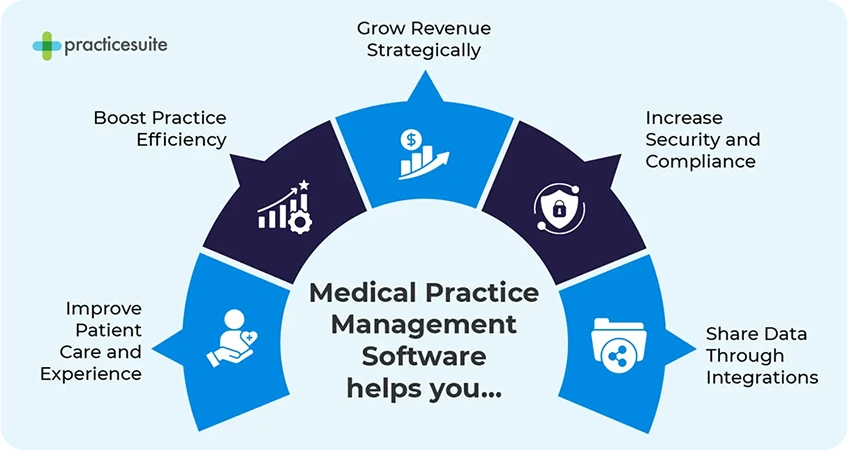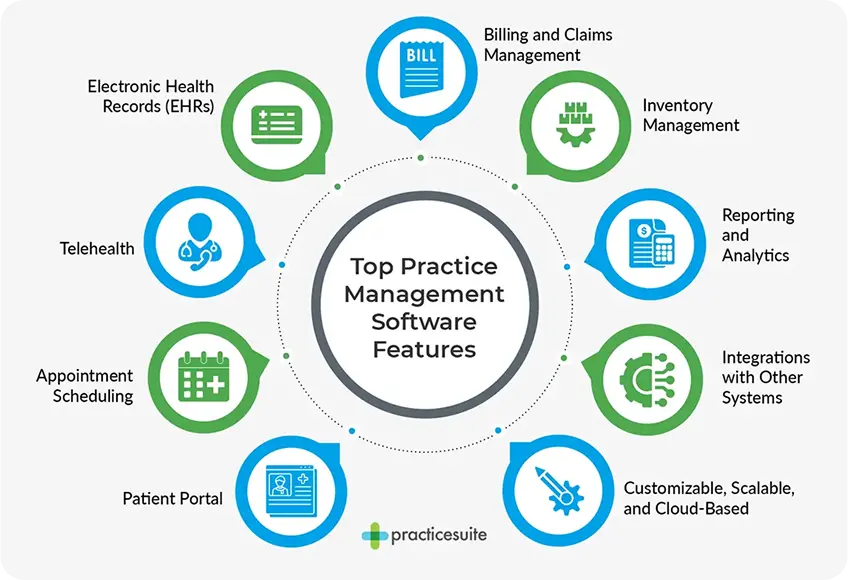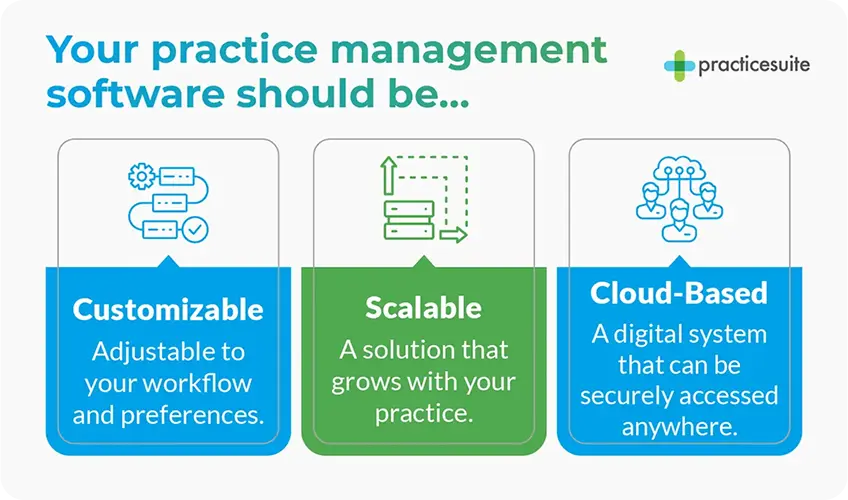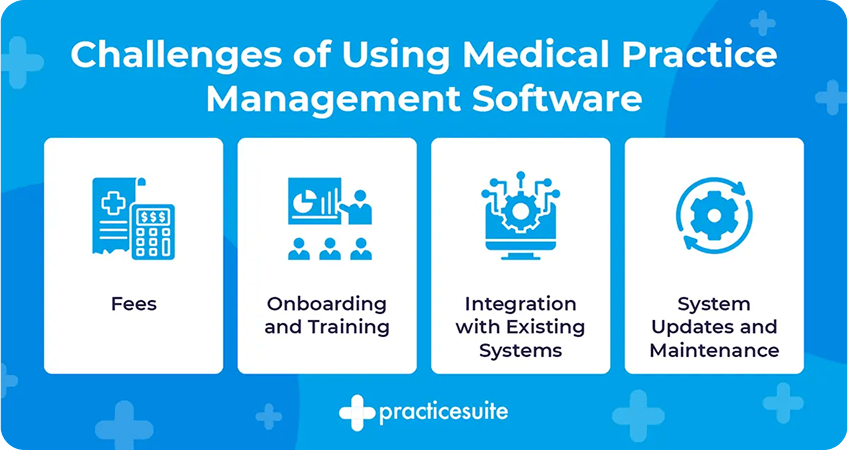11 Top Medical Practice Management Software Tools for 2026

Running a physician’s practice, medical office, hospital, or other healthcare organization is complicated. That’s why many of these groups turn to practice management software to simplify the process and reduce staff burden. In this guide, we’ll cover everything you need to know about practice management software:
- Medical Practice Management Software FAQs
- Why is Medical Practice Management Software Important for Medical Entities?
- What are the Key Features of Medical Practice Management Software?
- What are the Challenges of Using Medical Practice Management Software?
- How to Choose a Medical Practice Management Solution
- 11 Top Medical Practice Management Software Solutions
With the right practice management tools, you’ll be able to handle management, administrative, and financial tasks essential to keeping your medical practice operating smoothly. Use the information in this guide as a jumping-off point to decide whether a practice management system is the right purchase for your medical practice and which solution to start with.
Medical Practice Management Software FAQs
What is Medical Practice Management Software?
Medical practice management involves many tasks, such as conducting medical billing, sending patient communications, filing insurance claims, and keeping inventory organized. These tasks can be time-consuming and complicated when performed with pen and paper, Excel sheets, or weak software.
That’s where software steps in. Medical practice management software provides a comprehensive solution that helps you handle all practice management tasks. It includes features that streamline and automate administrative, operative, and financial responsibilities, making it easier overall to run your practice. With a robust solution, you’ll greatly simplify work for staff members, provide better care to patients, and improve your overall practice management efforts.
What is the Difference Between Practice Management Software and an EHR?
Practice management software handles your administrative tasks. It focuses on the front desk and back office responsibilities that keep your medical practice running, including everything from patient scheduling to submitting insurance claims.
An Electronic Health Record (EHR) system focuses on the medical side of the practice. Its primary purpose is to provide physicians with a tool to chart patient visits, but it may also include capabilities such as e-prescribing, tracking medical history, and sharing data with other providers.
Many comprehensive practice management solutions or medical software platforms integrate both practice management and EHR features, which is why these terms may get confused.
How Much Does Medical Practice Management Software Cost?
There is no standard pricing for medical practice management software, as fees vary based on several factors. These include:
- The size of your practice
- The number of providers or physicians using it
Depending on which provider you select, you may also choose between paying one-time for a software license or paying a monthly subscription fee. Other costs associated with practice management software include configuration, data migration, training, and ongoing maintenance.
How Long Does It Take to Implement New Practice Management Software?
Implementation time varies by the size of your medical practice, the complexity of your data migration, whether you require hardware upgrades, the level of workflow customization you want, and the amount of training your staff members need.
Generally, solo or small practices can expect the process to take 4–8 weeks; mid-sized practices, 3–6 months; and large medical groups or enterprise-level organizations may see a timeline of 6–12 months, sometimes more.
Why is Medical Practice Management Software Important for Medical Entities?
Aside from helping you handle all aspects of practice management, a robust medical office solution will help you:

- Improve patient care and experience. With organized patient health records, streamlined appointment scheduling, and more, your providers can make informed decisions about patient healthcare and make it easy for patients to take charge of their health.
- Boost practice efficiency. The right medical office software will automate and streamline your organization’s practice management tasks, saving your staff members time and effort. This allows them to manage their time more efficiently and boosts their productivity.
- Grow revenue strategically. Many medical practice management software solutions come with revenue cycle management (RCM) features, simplifying billing, invoicing, and payment processes. Your solution should help you capture more revenue by appealing denied claims and reducing billing errors.
- Increase security and compliance. Modern practice management systems provide tools to secure patient data and maintain privacy, complying with HIPAA. They also come with analytics features that help you generate reports to show that your organization complies with all relevant regulations.
- Share data through integrations. Your practice management software will integrate with other relevant software and enable easy data sharing with other healthcare entities, such as labs, specialists, and insurance providers. This helps patients get the best care possible by improving collaboration and treatment continuity.
You can think of medical practice management software as an all-in-one tool that helps you handle your existing tasks, troubleshoot inefficiencies, and pinpoint areas to grow and improve. These solutions don’t just help healthcare organizations that are getting bogged down with practice management—they also bring already-thriving practices to a new level of success.
What are the Key Features of Medical Practice Management Software?
Since practice management encompasses a wide variety of tasks, the best software solutions also include many features to address your every responsibility. When shopping around for comprehensive medical practice management software, look for solutions that include these features:

Additionally, you want a solution that’s:

- Customizable. Software should be configurable to meet your organization’s needs. For example, if you run a healthcare organization with multiple locations, your software should be able to accommodate the differing workflows of each location.
- Scalable. As software implementation can be costly and time-consuming, it’s best to invest in medical practice management software that can grow with your medical office. Look for solutions that allow you to use the features you need and give you the option to add on more as your organization expands.
- Cloud-based. Cloud-based systems are accessible online, providing better flexibility than traditional, on-premise systems. Plus, multiple staff members can access the data stored in your solution, resulting in improved collaboration.
Although these aren’t necessarily “features” of medical practice management software, they’re still important characteristics you should look for.
What are the Challenges of Using Medical Practice Management Software?
Using practice management software is not without its frustrations. You may face certain challenges associated with your solution, such as:

- Fees. For independent and smaller medical organizations, software costs can be burdensome. On top of one-time fees for software licenses or monthly subscriptions, you may also need to pay for implementation, training, and maintenance, which can quickly add up.
- Onboarding and training. Regardless of your chosen system, your organization’s staff members and patients must get familiar with using the new solution. Onboarding and training your staff members on the new software can be difficult, especially if some of them aren’t familiar with the technology or are resistant to change.
- Integration with existing systems. If your organization has existing software, you must look for practice management software that integrates with it. This can pose a challenge, especially if the original system is old or obscure. In some cases, organizations need to entirely migrate from their old system to use a new one.
- System updates and maintenance. Medical practice management systems need regular updates to improve functionality, increase security, and comply with regulations. These updates may cause your software to stop working temporarily or may require additional training for staff members.
Due to these challenges, many healthcare professionals ask, is medical practice management software worth the investment? Only you can answer that question for your medical practice, but many healthcare organizations find that the advantages far outweigh the disadvantages. Ultimately, it depends on your budget constraints and capacity—but keep in mind that practice management software is, by nature, designed to make managing and running your organization easier!
How to Choose a Medical Practice Management Solution
At this point, you’re probably excited to dive into the top medical practice management software providers. But if you go at it without a strategy, you’ll quickly get overwhelmed by all the great options. Before you can select solutions that might work for your medical practice, you need to follow these three steps:
- Assess your needs. Determine what you’re looking to get out of your medical practice management solution. Consider your organization’s size, the features you want, any specialty requirements, and any integrations.
- Establish your budget. Work with your financial team or department to determine how much funding you can afford to spend on software. Remember that there may be regular costs as well as one-time fees.
- Determine your timeline. Decide how quickly you need to implement your new software. If you need the features urgently, you may need to pay extra for the provider to help you stick to a tight timeline.
Then, as you research solutions, ask yourself the following questions:
- Will it address the main pain points you’re facing?
- Does it work for your specific needs, such as your practice’s specialty?
- How does the software ensure data security and HIPAA compliance?
- How user-friendly is the software?
- Is the solution customizable or designed to adapt to our workflow?
- What does onboarding, training, and ongoing support look like?
- What is the total cost of using it?
- How will the software improve the patient experience?
- Does the vendor or provider have a good reputation?
Based on the answers to these questions, identify a list of solutions you’re interested in purchasing. Do a deep dive into these solutions—read reviews, schedule calls, and book trials and demos. If you have any questions about working with a vendor, be sure to ask them during your consultation.
11 Top Medical Practice Management Software Solutions
Let’s take a look at the top medical practice management software vendors your medical office should consider working with.
1. PracticeSuite
If you’re looking for all-in-one practice management software that can meet your needs now and scale with you as you grow, look no further than PracticeSuite. We empower your practice to care, collect, connect, collaborate, build credibility, prevent cyberattacks, and be compliant, all in one platform.
With our practice management software, you’ll gain access to:
- Simplified scheduling across multiple providers and multiple locations
- Color-coded appointment type and status
- Automated patient eligibility checks
- Efficient claim management and fixes for rejected claims
- Integrated credit card processing and collections management
- Over 140 reports designed to help you stay on top of your practice’s financial report
- A customizable and scalable platform that ensures you only pay for what you use
- Superior customer service
PracticeSuite has been in business for over 20 years and has a 99% customer satisfaction rate. We offer a host of interoperable medical software solutions for over 160 specialties, ensuring that your data flows seamlessly from one tool to the next. With our end-to-end cloud-based medical practice management solution, we give you time back in your day to focus on your patients—you can leave the work to us.
2. MicroMD
MicroMD is an all-in-one healthcare information technology platform connecting your independent practice to the patient journey. Its practice management tools allow medical practices to maximize their profitability and stay independent by automating medical billing, enabling simple patient scheduling, and managing comprehensive patient information.
3. athenahealth
athenahealth builds modern technology to partner with healthcare organizations across the care continuum. One of their tools is medical practice management software. Their solution focuses on the financial side, enabling more efficient practice management by relieving RCM work and optimizing financial performance. With athenahealth, you can simplify medical billing, submit cleaner claims, and boost revenue cycle visibility.
4. SimplePractice
SimplePractice is an all-in-one medical practice management software built for behavioral health specialists. If you’re a therapist, speech-language pathologist, occupational therapist, psychiatrist, or another behavioral health provider, this solution may be the right pick for you. SimplePractice’s tools focus on streamlining admin tasks, improving client care, and managing your practice. With these capabilities at your fingertips, you can unlock growth potential and boost revenue.
5. Oracle
Oracle’s mission is to help people see data in new ways, discover insights, and unlock endless possibilities. This group strives to fulfill that mission by creating solutions that support companies in various industries, including healthcare. Its clinical and financial operations product is designed to help medical practices deliver data-driven care, simplify care delivery, and reimagine the healthcare experience.
6. NextGen Healthcare
NextGen Healthcare provides technological solutions for ambulatory healthcare organizations. While most lauded for its EHR system, it also offers medical practice management tools designed to support medical enterprises. Their solution has received high ratings from providers in cardiology, internal medicine, neurosurgery, pediatrics, sleep medicine, and pulmonary care. With NextGen Healthcare’s tools, you can save valuable time, align your technology with your goals, and more.
7. CareCloud
CareCloud offers a comprehensive suite of software solutions to empower healthcare organizations to gain control of their future. Their medical practice management solution empowers healthcare providers to improve practice efficiency by managing patient interactions. It includes tools that help providers streamline administrative tasks, build better billing procedures, and create error-free documentation.
8. Tebra
Tebra, formerly Kareo, offers tools for practice growth and the patient experience. One of those tools is their practice management solution, which makes it easy to manage medical billing and get paid faster. Aside from a workflow dashboard that helps save time, you’ll also have greater control over eligibility checks, charge capture, claims, and more. Plus, with automation, you’ll increase productivity and profitability.
9. PracticeQ
While mainly an EHR system, PracticeQ also comes with practice management features, so you can handle everything from automated patient intake to comprehensive insurance billing. It provides solutions for various healthcare practices, including behavioral health, med spas, and IV infusion clinics. Additionally, PracticeQ offers valuable integrations to ensure you can work with your existing tools and supercharge efficiency.
10. CureMD
CureMD’s medical practice management software accelerates revenue and productivity. It offers enterprise functionality, including key performance indicator (KPI) dashboards, electronic claims and remittances, patient portals, online payments, and more. It also helps healthcare organizations optimize inventory management to efficiently stock, dispense, and sell medications, vaccines, and more. With CureMD’s tools, you can empower everyone in your practice.
11. Claimocity
Claimocity is a practice management solution for healthcare providers on the go. Their mobile platform helps medical providers address all their practice management tasks, including billing and scheduling, no matter where they are. Claimocity also offers charge capture, clinical notes, and revenue cycle management features that will boost your practice’s efficiency and help you secure more reimbursements.
Additional Resources
Purchasing practice management software is a big leap for many medical offices and organizations. It’s natural to feel stressed, even overwhelmed, at the thought of such a large undertaking. However, with the information in this guide, you have all the tools you need to decide whether software is the right choice for your organization and which solutions best fit your needs.
If you’d like to learn more about software for medical organizations, check out these guides:
- 20+ Best Medical Billing Software Solutions. Medical billing is a complex part of practice management. Explore solutions built specifically for billing here.
- 10+ Top EHR Software Providers for Detailed Records. Electronic health records provide a comprehensive view of a patient’s medical history and care. Discover top vendors in this resource.
- Top 7 Revenue Cycle Management (RCM) Companies. If you want to outsource your RCM tasks to an expert, consider working with one of these RCM companies.






